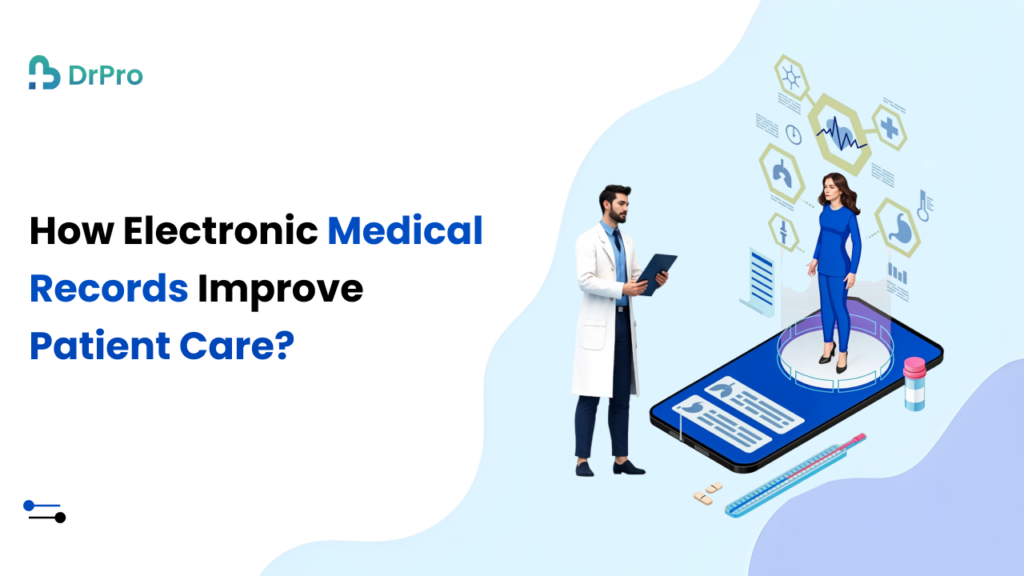Healthcare providers continuously look for ways to enhance patient care. One major innovation trend that has emerged recently is the Electronic Medical Record (EMR)/Electronic Patient Record (EPR). These digital records enable doctors and hospitals to manage patient information more efficiently, thus improving the whole spectrum of treatment and the healthcare experience.
In this article, we will see how Electronic Medical Records (EMRs) improve patient care, EMR benefits, and the reasons behind their uptake in hospitals and clinics.
What Are Electronic Medical Records (EMRs)?
An EMR, or electronic medical record, is an online counterpart of a patient’s former medical history. It spans a wide variety of information, such as:
- Patient demographics (name, age, contact details)
- Medical history (previous illnesses, surgeries, allergies)
- Diagnoses and treatment plans
- Lab test results
- Prescriptions and medications
- Doctor’s notes and observations
However, these records provide easy access, up-to-date information, and sharing possibilities with authorized healthcare professionals, unlike paper records.
📲 Follow us on Facebook, Instagram, Twitter, App Store, IOS Store, LinkedIn & YouTube for more wellness tips!
How Electronic Medical Records Improve Patient Care
1. Faster and More Accurate Diagnosis
With an Electronic Medical Record, doctors can quickly access a patient’s medical history, allowing them to make appropriate decisions. If a patient has allergies or has chronic conditions, the doctor will see that and immediately decide on the safest and most effective treatment.
2. Better Coordination Between Healthcare Providers
Some patients consult with various doctors regarding several health problems. Electronic Medical Records allow all providers involved in a patient’s care to work from the same current information, thus reducing the risk of miscommunication and duplicate tests.
3. Reduced Medical Errors
Handwritten prescriptions and records can be prone to errors. With an EMR, there cannot be any confusion regarding an order since everything is provided in print and is written in structured medical records. Some EMR systems might even issue specific alerts to the physician about possible drug interaction or wrong dosage.
4. Easy Access to Patient History
With Electronic Medical Record, a doctor does not need to search through paper files anymore. Full access to a patient’s medical history with just the click of a mouse is particularly beneficial during emergencies when appropriate quick decisions can become life-saving.
5. Improved Patient Safety
Some EMR systems include reminders for physicians about necessary vaccinations, preventive screenings, and follow-up visits, ensuring that patients receive appropriate care at the right time.
6. More Efficient Treatment Plans
Doctors employing Electronic Medical Record can chart the patient’s progress over time. If treatment isn’t effective, adjustments to the treatment plan can be made through references to past medical data, enabling better results for the patient.
7. Enhanced Patient Engagement
Many types of Electronic Medical Record systems enable patient to access their medical records via online portals. Patients can:
-
- Check test results
- Schedule appointments
- Communicate with their physicians
- Refill prescriptions
This encourages patients to engage themselves in their health.
More Updates: EHR Systems Why Clinics and Hospitals Are Switching
8. Faster and More Organized Billing
For medical billing software, EMRs can be used in conjunction with the hospital and insurance systems, eliminating paperwork, reducing billing errors, and speeding the processing time for insurance claims.
9. Secure and Confidential Data Storage
EMR systems use encryption and other security systems to ensure the security of patients’ sensitive information. Unlike paper records, which may be lost or damaged, EMRs are kept securely with backing up.
10. Better Research and Public Health Monitoring
EMRs enable healthcare organizations to evaluate disease patterns and improve treatment. Governments and researchers can use anonymized patient data to track public health trends and amply better healthcare policies.
The Role of “DrPro” in EMR Adoption
Cost and training-related aspects act as barriers to many hospitals or clinics while taking up the EMR system. However, that barrier is effectively converted into a catalyst for change by DrPro, the modern solution that facilitates a smooth transition for health care providers. Among the solutions DrPro provides are:
- User-friendly interface for doctors and staff
- Strong security measures to protect patient data
- Seamless integration with other hospital systems
- Cost-effective solutions for clinics and hospitals of all sizes
DrPro Electronic Medical Record system assures that it will improve patient care, reduce errors, and improve the whole efficiency of the healthcare provider.
Conclusion
The increasing adoption of Electronic Medical Records (EMRs) is bringing about changes in healthcare by providing easy access to, accuracy of, and security for patient data. EMR implementation lessens errors in diagnosis and treatment coordination, as well as in patient safety, coupled with an increase in the errors related to administration.
As more clinics and hospitals migrate to EMR systems, a better healthcare experience, instant treatment, and an overall enhancement in patient health will be expected by patients. EMRs are not just an investment in technology but also an investment in better care and a tool for saving lives.
Frequently Asked Questions
Q1. What is the main purpose of Electronic Medical Records (EMRs)?
EMRs store and manage patient medical information digitally, making it easier for doctors to access and update records.
Q2. How do Electronic Medical Records improve patient safety?
EMRs reduce medical errors, alert doctors to drug interactions, and make sure vaccinations and screening occur promptly.
Q3. Are EMR systems secure?
Yes, EMRs utilize encryption and security protocols for preventing unauthorized access to patient data.
Q4. How do Electronic Medical Records benefit hospitals and clinics?
EMRs improve workflow efficiency, reduce paperwork, and facilitate faster billing and claims processing.
Q5. Can patients access their Electronic Medical records through EMRs?
Yes, some Electronic Medical Record systems provide a patient portal through which patients can view test results, schedule appointments, and contact their doctors.


